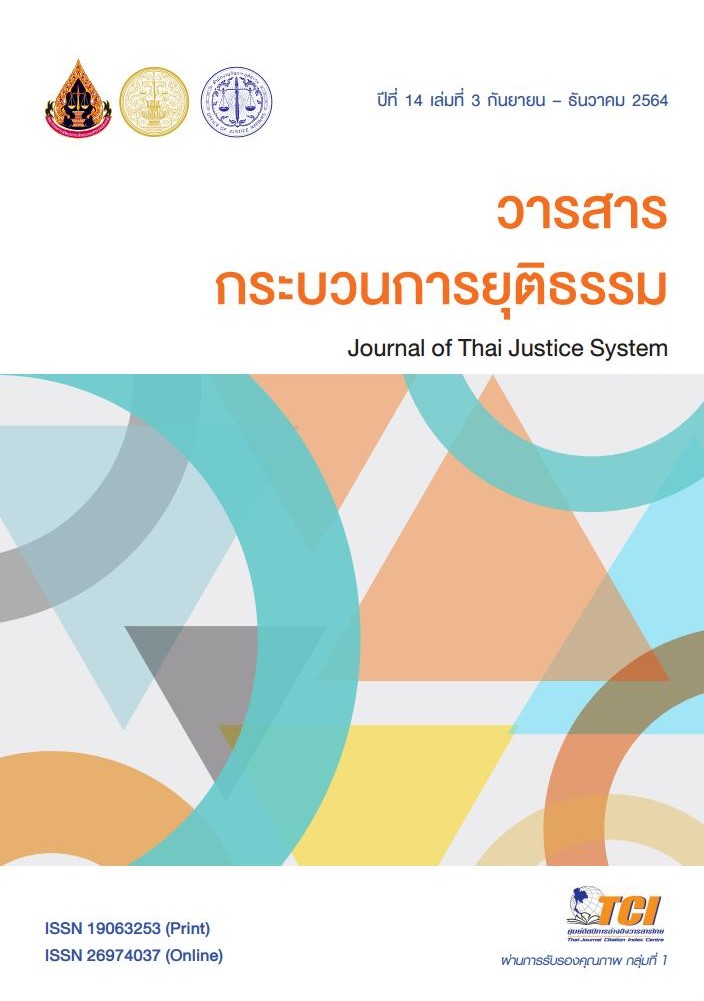แนวทางการควบคุมตนเองของเด็กและเยาวชน ที่ไม่กลับไปกระทำผิดซ้ำในคดีเกี่ยวกับยาเสพติดให้โทษ กรณีศึกษา ศูนย์ฝึกและอบรมเด็กและเยาวชนพระนครศรีอยุธยา
Main Article Content
บทคัดย่อ
การวิจัยครั้งนี้มีวัตถุประสงค์เพื่อศึกษาแนวทางการควบคุมตนเองของเด็กและเยาวชน
ที่ไม่กลับไปกระทำผิดซ้ำในคดีเกี่ยวกับยาเสพติดให้โทษ ในช่วงเวลาที่ได้รับการปล่อยตัวจากศูนย์ฝึกและอบรมเด็กและเยาวชน และเพื่อศึกษาปัจจัยที่มีผลทำให้เด็กและเยาวชนไม่กระทำผิดซ้ำในคดีเกี่ยวกับยาเสพติดให้โทษ รวมถึงเพื่อเสนอแนะแนวทางในการป้องกันการกระทำผิดซ้ำของเด็กและเยาวชนในคดีเกี่ยวกับยาเสพติดให้โทษ โดยใช้ระเบียบวิธีการวิจัยเชิงคุณภาพ ด้วยวิธีการสัมภาษณ์เชิงลึก จากกลุ่มตัวอย่าง ทั้ง 3 กลุ่ม ได้แก่ (1) เด็กและเยาวชนที่ไม่กระทำผิดซ้ำในฐานความผิดเกี่ยวกับยาเสพติดให้โทษ ภายในระยะเวลา 6 เดือน จำนวน 10 ราย และ (2) เจ้าหน้าที่ในตำแหน่งนักสังคมสงเคราะห์ จำนวน 2 ราย ตำแหน่งนักจิตวิทยา จำนวน 1 ราย โดยมีประสบการณ์การทำงานด้านเด็กและเยาวชนที่กระทำผิดมาแล้วอย่างน้อย 3 ปี รวมถึง (3) ศึกษาครอบครัวของเด็กและเยาวชน จำนวน 3 ครอบครัว ที่ศาลเคยตัดสินให้เข้ารับการฝึกอบรมในศูนย์ฝึกและอบรมเด็กและเยาวชนพระนครศรีอยุธยามาแล้ว 1 ครั้ง ในคดีเกี่ยวกับยาเสพติดให้โทษ แล้วไม่กลับ ไปกระทำผิดซ้ำในคดีเกี่ยวกับยาเสพติดให้โทษอีก ภายในระยะเวลา 6 เดือน ทั้งนี้ได้ทำการศึกษาจาก กลุ่มตัวอย่างในพื้นที่ศูนย์ฝึกและอบรมเด็กและเยาวชนพระนครศรีอยุธยา จำนวนรวมทั้งสิ้น 16 ราย
ผลการวิจัย พบว่า แนวทางการควบคุมตนเองของเด็กและเยาวชนที่ไม่กลับไปกระทำผิดซ้ำในคดีเกี่ยวกับยาเสพติดให้โทษ ในช่วงเวลาที่ได้รับการปล่อยตัวจากศูนย์ฝึกและอบรมเด็กและเยาวชน คือ (1) การตระหนักถึงความรักและความห่วงใยของครอบครัว (2) การที่เด็กและเยาวชนได้รับโอกาสและการส่งเสริมสนับสนุนจากสังคม (3) การตั้งเป้าหมายในชีวิต และมุ่งมั่นตั้งใจทำตามเป้าหมายอย่างแน่วแน่ (4) การรู้จักที่จะอดทนรอคอยความสำเร็จ (5) การมีทักษะในการปฏิเสธ (6) การมีทักษะในการเลือกคบเพื่อน (7) การมีทักษะในการผ่อนคลายอารมณ์ (8) การหลีกเลี่ยงสภาพการณ์ หรือสถานการณ์ที่มีความเสี่ยงให้กลับไปยุ่งเกี่ยวกับยาเสพติด (9) การนึกถึงประโยชน์และโทษในการไม่กลับไปหรือกลับไปเกี่ยวข้องกับยาเสพติด (10) การหวนคิด/นึกถึง การกลับเข้าไปในสถานควบคุม (11) การกำหนดต้นแบบที่ดีเพื่อยึดถือ เป็นแบบอย่างในการดำเนินชีวิต และปัจจัยที่มีผลทำให้เด็กและเยาวชนไม่กระทำผิดซ้ำในคดีเกี่ยวกับยาเสพติดให้โทษ มีความเกี่ยวข้องกับปัจจัยในหลาย ๆ ด้าน ทั้งปัจจัยด้านตนเอง ปัจจัยด้านครอบครัวและบุคคลใกล้ชิด ปัจจัยด้านสังคมชุมชน ปัจจัยด้านการคบเพื่อน และปัจจัยด้านแบบอย่างที่ดี รวมถึงปัจจัยด้านการใช้เวลาว่างให้เป็นประโยชน์ โดยแนวทางในการป้องกันการกระทำผิดซ้ำของเด็กและเยาวชนในคดีเกี่ยวกับยาเสพติดให้โทษ ในส่วนระดับปฏิบัติ กรมพินิจและคุ้มครองเด็กและเยาวชน กระทรวงยุติธรรม ควรเน้นการเรียนรู้และเพิ่มโปรแกรมหรือกิจกรรมที่พัฒนาทักษะชีวิตเด็กและเยาวชน และควรเสริมสร้างให้เด็กและเยาวชนมีการวางแผนอนาคต อีกทั้งควรเน้นกระบวนการเตรียมความพร้อมก่อนปล่อย โดยเฉพาะการให้เด็กและเยาวชนออกไปเตรียมความพร้อมก่อนปล่อยตัวภายนอกสถานควบคุม รวมถึงควรมีการอบรมให้ความรู้ส่งเสริมทักษะการเลี้ยงดูลูกวัยรุ่น การดูแลเด็กและเยาวชนภายหลังปล่อยตัวอย่างเหมาะสมให้แก่ผู้ปกครอง นอกจากนี้สถาบันครอบครัวและสถาบันการศึกษาควรมีการปลูกฝังความกตัญญูกตเวทีให้แก่เด็กและเยาวชน และควรส่งเสริมให้เด็กและเยาวชนใช้เวลาว่างที่เหมาะสมควบคู่ไปด้วย ในระดับนโยบาย กรมพินิจและคุ้มครองเด็กและเยาวชน กระทรวงยุติธรรม ควรผลักดันให้มีการจัดตั้งศูนย์เตรียมความพร้อมก่อนปล่อย และเพิ่มการประชาสัมพันธ์เพื่อให้เกิดการให้โอกาสเด็กและเยาวชนที่เคยกระทำผิด รวมถึงผลักดันให้มีระบบการติดตาม การส่งต่อ และเฝ้าระวังเด็กและเยาวชน ที่มีความเสี่ยงกระทำผิดซ้ำในคดียาเสพติด โดยอาศัย การมีส่วนร่วมของเครือข่ายที่มีความใกล้ชิดกับเด็กและเยาวชน ตลอดจนการสร้างความตระหนักและจิตสำนึกที่ดีให้กับประชาชนในการมีส่วนร่วมป้องกันปัญหาการกระทำผิดซ้ำเกี่ยวกับยาเสพติดของเด็กและเยาวชน
Article Details
ต้นฉบับที่ได้รับการตีพิมพ์ในวารสาร เป็นลิขสิทธิ์ของวารสารกระบวนการยุติธรรม แต่ความคิดเห็นที่ปรากฏในเนื้อหาของบทความในวารสารกระบวนการยุติธรรม ถือเป็นความรับผิดชอบของผู้เขียนแต่เพียงผู้เดียว
เอกสารอ้างอิง
กชพร เผือกผ่อง. (2560). ผลของโปรแกรมการเสริมสร้างพลังอำนาจต่อการควบคุมตนเองของผู้เสพติดแอมเฟตามีน. วิทยานิพนธ์พยาบาลศาสตรมหาบัณฑิต, มหาวิทยาลัยธรรมศาสตร์.
กรมพินิจและคุ้มครองเด็กและเยาวชน. (2563). รายงานผลการตรวจสอบการกระทำผิดซ้ำ ประจำปี งบประมาณ 2560-2562. กรุงเทพฯ: ผู้แต่ง.
กาญจนา คุณารักษ์. (2555). การพัฒนารูปแบบการป้องกันการกระทําผิดซ้ำเกี่ยวกับยาเสพติด : กรณีศึกษา สถานพินิจและคุ้มครองเด็กและเยาวชน. วิทยานิพนธ์ปรัชญาดุษฎีบัณฑิต. มหาวิทยาลัยศิลปากร.
คณะกรรมการส่งเสริมการพัฒนาเด็กและเยาวชนแห่งชาติ. (2561). แผนพัฒนาเด็กและเยาวชนแห่งชาติ ฉบับที่ 2 พ.ศ. 2560-2564 (พิมพ์ครั้งที่ 2). กรุงเทพฯ: เจ. เอส. การพิมพ์.
คมชัดลึก. (2559). กระบวนการปลูกฝังความกตัญญูกตเวทีเชิงพุทธ แก้ปัญหาความบกพร่องทางคุณธรรมจริยธรรมของเยาวชนได้. ค้นเมื่อ 14 มิถุนายน 2564, จาก www.komchadluek.net/news/knowledge/220609
จารุณี แซ่ตั้ง. (2548). การศึกษาปัจจัยที่มีผลต่อการไม่กระทำผิดซ้ำของเยาวชน ศึกษากรณีศูนย์ฝึกและอบรมเด็กและเยาวชนชายบ้านกรุณา. วิทยานิพนธ์ศิลปศาสตรบัณฑิต. มหาวิทยาลัยมหิดล.
ชาตรี ชีวาวัฒนานนท์. (2559). ปัจจัยที่มีอิทธิพลต่อการกระทำความผิดในคดียาเสพติดเยาวชน จังหวัดพิษณุโลก. วิทยานิพนธ์วิทยาศาสตรบัณฑิต. มหาวิทยาลัยนเรศวร.
ณัฐวุฒิ จันดี. (2555). ปัญหาการแก้ไขการกระทำผิดซ้ำในคดียาเสพติดของเยาวชนในศูนย์ฝึกและอบรมเด็กและเยาวชนเขต 7 จังหวัดเชียงใหม่. วิทยานิพนธ์รัฐประศาสนศาสตรมหาบัณฑิต.มหาวิทยาลัยเชียงใหม่.
ไทยพีบีเอส. (2555). เตรียมความพร้อมเยาวชนก่อนออกจากสถานพินิจฯ. ค้นเมื่อ 14 มิถุนายน 2564, จาก https://news.thaipbs.or.th/content/118215
ธนวุฒิ เศขรฤทธิ์. (2554). การศึกษาพฤติกรรมการเลียนแบบศิลปินต้นแบบละครโทรทัศน์ของนักศึกษามหาวิทยาลัยกรุงเทพ. วิทยานิพนธ์นิเทศศาสตรมหาบัณฑิต. มหาวิทยาลัยกรุงเทพ.
พัชราภรณ์ ด่านประชุม. (2556). ปัจจัยที่ส่งผลต่อพฤติกรรมการป้องกันตนเองจากยาเสพติดของนักเรียนในระดับมัธยมศึกษาตอนต้น โรงเรียนอนุบาลวังสมบูรณ์ จังหวัดสระแก้ว. วิทยานิพนธ์รัฐประศาสนศาสตรมหาบัณฑิต, มหาวิทยาลัยบูรพา.
พีร วงศ์อุปราช และชาญคณิต ก.สุริยะมณี. (2554). การทดสอบโครงสร้างทฤษฎีการควบคุมตนเองต่ำในเด็กและเยาวชนที่กระทำผิดซ้ำในศูนย์ฝึกและสถานพินิจทั่วประเทศ. วารสารมนุษยศาสตร์และสังคมศาสตร์ มหาวิทยาลัยธนบุรี, 5(9), 5-22.
รัชนีกร ต๊ะม่าน. (2556). แนวทางการป้องกันและแก้ไขการกระทำผิดซ้ำของเด็กและเยาวชนในจังหวัด
แม่ฮ่องสอน. การค้นคว้าอิสระ, มหาวิทยาลัยเชียงใหม่.
วันวิสา เพ็งอุดม. (2561). ศูนย์เตรียมความพร้อมก่อนปล่อยในประเทศสหรัฐอเมริกาและออสเตรเลีย. ค้นเมื่อ 14 มิถุนายน 2564, จาก https://www.gotoknow.org/posts/656613
ศิริวรรณ กมลสุขสถิต. (2557). แนวทางในการป้องกันและแก้ไขการกระทำผิดซ้ำของเด็กและเยาวชน ในคดีความผิด เกี่ยวกับยาเสพติดโดยอาศัยปัจจัยที่เป็นตัวทำนายทางด้านอาชญาวิทยา. วิทยานิพนธ์นิติศาสตร์บัณฑิต. มหาวิทยาลัยราชภัฏนครสวรรค์.
ศุภร ชินะเกตุ. (2553). ปัจจัยที่ส่งผลต่อพฤติกรรมป้องกันยาเสพติดของนักเรียนระดับประกาศนียบัตรวิชาชีพ สังกัดอาชีวศึกษา จังหวัดราชบุรี. วิทยานิพนธ์ศึกษาศาสตรมหาบัณฑิต. มหาวิทยาลัยศิลปากร.
หนังสือประเทศ
Bandura, A. (1986). Social foundations of thought and action: A social cognitive Theory. NJ: Prentice-Hall.
Erikson, E. H. (1950). Childhood and society. New York: W.W. Norton.
Gottfredson, M. R., & Hirschi, T. (1990). A general theory of crime. CA: Stanford University Press.
Hirschi, T. (1969). Causes of delinquency. CA: University of California Press.
Patton, M. Q. (1990). Qualitative evaluation and research methods (2 nd ed.). CA: Sage.
Rosenbaum, M. (1980). A schedule for assessing self-control behavior: Preliminary findings. Behavior Therapy. Behavior Therapy, 11(1), 109 - 121.
Stoltz, P. G. (1997). Adversity quotient: Turning obstacles into opportunities. NY: John Wiley & Son.
Sutherland, E. H. (1985). White collar crime: The uncut version. LDN: Yale University Press.
Thoresen, C. E., & Mahoney, M. J. (1974). Behavioral self-control. NY: Rinehart & Winston.


